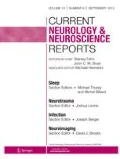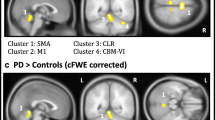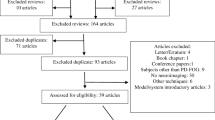Abstract
Neuroimaging has been applied to better understand the neural mechanisms underlying gait disturbances in Parkinson’s disease (PD). In the present paper, we review studies that used neuroimaging methods to investigate mobility, walking and freezing of gait (FOG) in PD, focusing on the recent literature. Examination of these studies suggests that gait changes in PD are due to widespread alterations in the structure and function of the brain that go beyond the basal ganglia. For example, cortical structures including the frontal and parietal lobes, the mesencephalic locomotor region and specifically, the pedunculopontine nucleus, all apparently play important roles in the control of gait in PD. Nonetheless, there are some significant inconsistencies across the different studies and many questions remain regarding the precise pathological processes that contribute to gait disturbances, in general, and to FOG, more specifically. A discussion of new insights into the neural mechanisms underlying gait disturbances are presented along with a summary of the disadvantages and limitations of the existing techniques and suggestions for future directions.
Similar content being viewed by others
References
Papers of particular interest, published recently, have been highlighted as: • Of importance •• Of major importance
•• Grabli D, Karachi C, Welter ML, Lau B, Hirsch EC, Vidailhet M, et al. Normal and pathological gait: what we learn from Parkinson’s disease. J Neurol Neurosurg Psychiatry. 2012;83:979–85. This article provides a comprehensive description of gait and balance disorders, highlights the neuronal systems that may be involved in the physiopathology of these disorders in PD, and reviews evidence regarding functional neurosurgery.
Maillet A, Pollak P, Debu B. Imaging gait disorders in parkinsonism: a review. J Neurol Neurosurg Psychiatry. 2012;83:986–93.
Nutt JG, Horak FB, Bloem BR. Milestones in gait, balance, and falling. Mov Disord. 2011;26:1166–74.
Jahn K, Deutschlander A, Stephan T, Kalla R, Wiesmann M, Strupp M, et al. Imaging human supraspinal locomotor centers in brainstem and cerebellum. NeuroImage. 2008;39:786–92.
Bartels AL, Leenders KL. Brain imaging in patients with freezing of gait. Mov Disord. 2008;23 Suppl 2:S461–7.
Bakker M, Verstappen CC, Bloem BR, Toni I. Recent advances in functional neuroimaging of gait. J Neural Transm. 2007;114:1323–31.
Miyai I, Tanabe HC, Sase I, Eda H, Oda I, Konishi I, et al. Cortical mapping of gait in humans: a near-infrared spectroscopic topography study. NeuroImage. 2001;14:1186–92.
Irani F, Platek SM, Bunce S, Ruocco AC, Chute D. Functional near infrared spectroscopy (fNIRS): an emerging neuroimaging technology with important applications for the study of brain disorders. Clin Neuropsychol. 2007;21:9–37.
Chanraud S, Zahr N, Sullivan EV, Pfefferbaum A. MR diffusion tensor imaging: a window into white matter integrity of the working brain. Neuropsychol Rev. 2010;20:209–25.
Mito Y, Yoshida K, Yabe I, Makino K, Tashiro K, Kikuchi S, et al. Brain SPECT analysis by 3D-SSP and clinical features of Parkinson’s disease. Hokkaido Igaky Zasshi. 2006;81:15–23.
Matsui H, Udaka F, Miyoshi T, Hara N, Tamaura A, Oda M, et al. Three-dimensional stereotactic surface projection study of freezing of gait and brain perfusion image in Parkinson’s disease. Mov Disord. 2005;20:1272–7.
Fabre N, Brefel C, Sabatini U, Celsis P, Montastruc JL, Chollet F, et al. Normal frontal perfusion in patients with frozen gait. Mov Disord. 1998;13:677–83.
Bartels AL, de Jong BM, Giladi N, Schaafsma JD, Maguire RP, Veenma L, et al. Striatal dopa and glucose metabolism in PD patients with freezing of gait. Mov Disord. 2006;21:1326–32.
Hanakawa T, Katsumi Y, Fukuyama H, Honda M, Hayashi T, Kimura J, et al. Mechanisms underlying gait disturbance in Parkinson’s disease: a single photon emission computed tomography study. Brain. 1999;122:1271–82.
Shine JM, Matar E, Ward PB, Bolitho SJ, Gilat M, Pearson M, et al. Exploring the cortical and subcortical functional magnetic resonance imaging changes associated with freezing in Parkinson’s disease. Brain. 2013;136:1204–15.
• Tessitore A, Amboni M, Cirillo G, Corbo D, Picillo M, Russo A, et al. Regional gray matter atrophy in patients with Parkinson disease and freezing of gait. AJNR Am J Neuroradiol. 2012;33:1804–9. This article is one of the few reports of GM changes and their association with freezing of gait in PD.
Wu T, Hallett M. A functional MRI study of automatic movements in patients with Parkinson’s disease. Brain. 2005;128:2250–9.
Ouchi Y, Kanno T, Okada H, Yoshikawa E, Futatsubashi M, Nobezawa S, et al. Changes in dopamine availability in the nigrostriatal and mesocortical dopaminergic systems by gait in Parkinson’s disease. Brain. 2001;124:784–92.
del Olmo MF, Arias P, Furio MC, Pozo MA, Cudeiro J. Evaluation of the effect of training using auditory stimulation on rhythmic movement in Parkinsonian patients—a combined motor and [18F]-FDG PET study. Parkinsonism Relat Disord. 2006;12:155–64.
• Kostic VS, Agosta F, Pievani M, Stefanova E, Jecmenica-Lukic M, Scarale A, et al. Pattern of brain tissue loss associated with freezing of gait in Parkinson disease. Neurology. 2012;78:409–16. This paper is one of the few reports of gray matter changes and their association with freezing of gait in PD.
Snijders AH, Leunissen I, Bakker M, Overeem S, Helmich RC, Bloem BR, et al. Gait-related cerebral alterations in patients with Parkinson’s disease with freezing of gait. Brain. 2011;134:59–72.
Herman T, Rosenberg-Katz K, Jacob Y, Giladi N, Hausdorff JM. Gray matter atrophy and freezing of gait in Parkinson’s disease: is the evidence black-on-white? Mov Disord. 2013 In press.
Sunwoo MK, Cho KH, Hong JY, Lee JE, Sohn YH, Lee PH. Thalamic volume and related visual recognition are associated with freezing of gait in nondemented patients with Parkinson’s disease, Parkinsonism and Related Disorders 2013. doi:10.1016/j.parkreldis.2013.07.023.
Rosenberg-Katz K, Herman T, Jacob Y, Giladi N, Hendler T, Hausdorff JM. Gray matter atrophy distinguishes between Parkinson disease motor subtypes. Neurology. 2013;80:1476–84.
Herman T, Rosenberg-Katz K, Jacob Y, Auriel E, Gurevich T, Giladi N, et al. White matter hyperintensities in Parkinson’s disease: do they explain the disparity between the postural instability gait difficulty and tremor dominant subtypes? PLoS One. 2013;8:e55193.
Schweder PM, Hansen PC, Green AL, Quaghebeur G, Stein J, Aziz TZ. Connectivity of the pedunculopontine nucleus in parkinsonian freezing of gait. Neuroreport. 2010;21:914–6.
Zheng JJ, Delbaere K, Close JC, Sachdev PS, Lord SR. Impact of white matter lesions on physical functioning and fall risk in older people: a systematic review. Stroke. 2011;42:2086–90.
Iseki K, Hanakawa T, Hashikawa K, Tomimoto H, Nankaku M, Yamauchi H, et al. Gait disturbance associated with white matter changes: a gait analysis and blood flow study. NeuroImage. 2010;49:1659–66.
de Laat KF, Tuladhar AM, van Norden AG, Norris DG, Zwiers MP, de Leeuw FE. Loss of white matter integrity is associated with gait disorders in cerebral small vessel disease. Brain. 2011;134:73–83.
Piccini P, Pavese N, Canapicchi R, Paoli C, Del DP, Puglioli M, et al. White matter hyperintensities in Parkinson’s disease. Clinical correlations. Arch Neurol. 1995;52:191–4.
Stern MB, Braffman BH, Skolnick BE, Hurtig HI, Grossman RI. Magnetic resonance imaging in Parkinson’s disease and parkinsonian syndromes. Neurology. 1989;39:1524–6.
Bohnen NI, Muller ML, Zarzhevsky N, Koeppe RA, Bogan CW, Kilbourn MR, et al. Leucoaraiosis, nigrostriatal denervation and motor symptoms in Parkinson’s disease. Brain. 2011;134:2358–65.
Lee SJ, Kim JS, Lee KS, An JY, Kim W, Kim YI, et al. The severity of leukoaraiosis correlates with the clinical phenotype of Parkinson’s disease. Arch Gerontol Geriatr. 2009;49:255–9.
Tessitore A, Amboni M, Esposito F, Russo A, Picillo M, Marcuccio L, et al. Resting-state brain connectivity in patients with Parkinson’s disease and freezing of gait. Parkinsonism Relat Disord. 2012;18:781–7.
Shine JM, Matar E, Ward PB, Bolitho SJ, Pearson M, Naismith SL, et al. Differential neural activation patterns in patients with Parkinson’s disease and freezing of gait in response to concurrent cognitive and motor load. PLoS One. 2013;8:e52602.
• Cremers J, D’Ostilio K, Stamatakis J, Delvaux V, Garraux G. Brain activation pattern related to gait disturbances in Parkinson’s disease. Mov Disord. 2012;27:1498–505. This article uses motor imagery and scanning to investigate MRI scanning to investigate alterations in brain activation patterns related to gait disturbances in PD.
Wai YY, Wang JJ, Weng YH, Lin WY, Ma HK, Ng SH, et al. Cortical involvement in a gait-related imagery task: comparison between Parkinson’s disease and normal aging. Parkinsonism Relat Disord. 2012;18:537–42.
Vercruysse S, Spildooren J, Heremans E, Wenderoth N, Swinnen SP, Vandenberghe W, et al. The neural correlates of upper limb motor blocks in parkinson’s disease and their relation to freezing of gait. Cereb Cortex. 2013 Jul 16.
Gilman S, Koeppe RA, Nan B, Wang CN, Wang X, Junck L, et al. Cerebral cortical and subcortical cholinergic deficits in parkinsonian syndromes. Neurology. 2010;74:1416–23.
Imamura K, Okayasu N, Nagatsu T. Cerebral blood flow and freezing of gait in Parkinson’s disease. Acta Neurol Scand. 2012;126:210–8.
Benitez-Rivero S, Marin-Oyaga VA, Garcia-Solis D, Huertas-Fernandez I, Garcia-Gomez FJ, Jesus S, et al. Clinical features and 123I-FP-CIT SPECT imaging in vascular parkinsonism and Parkinson’s disease. J Neurol Neurosurg Psychiatry. 2013;84:122–9.
Papo D. Why should cognitive neuroscientists study the brain’s resting state? Front Hum Neurosci. 2013;7:45.
Cohen RG, Chao A, Nutt JG, Horak FB. Freezing of gait is associated with a mismatch between motor imagery and motor execution in narrow doorways, not with failure to judge doorway passability. Neuropsychologia. 2011;49:3981–8.
Kostic VS, Agosta F, Petrovic I, Galantucci S, Spica V, Jecmenica-Lukic M, et al. Regional patterns of brain tissue loss associated with depression in Parkinson disease. Neurology. 2010;75:857–63.
Heremans E, Nieuwboer A, Vercruysse S. Freezing of gait in Parkinson’s disease: where are we now? Curr Neurol Neurosci Rep. 2013;13:350.
Yogev-Seligmann G, Hausdorff JM, Giladi N. The role of executive function and attention in gait. Mov Disord. 2008;23:329–42.
Vandenbossche J, Deroost N, Soetens E, Spildooren J, Vercruysse S, Nieuwboer A, et al. Freezing of gait in Parkinson disease is associated with impaired conflict resolution. Neurorehabil Neural Repair. 2011;25:765–73.
Heremans E, Nieuwboer A, Spildooren J, Vandenbossche J, Deroost N, Soetens E, et al. Cognitive aspects of freezing of gait in Parkinson’s disease: a challenge for rehabilitation. J Neural Transm. 2013;120:543–57.
Wu T, Hallett M. Neural correlates of dual task performance in patients with Parkinson’s disease. J Neurol Neurosurg Psychiatry. 2008;79:760–6.
Johannsen L, Li KZ, Chechlacz M, Bibi A, Kourtzi Z, Wing AM. Functional neuroimaging of the interference between working memory and the control of periodic ankle movement timing. Neuropsychologia. 2013;51:2142–53.
Kapreli E, Athanasopoulos S, Papathanasiou M, Van HP, Strimpakos N, Gouliamos A, et al. Lateralization of brain activity during lower limb joints movement. An fMRI study. NeuroImage. 2006;32:1709–21.
Dietz V, Duysens J. Significance of load receptor input during locomotion: a review. Gait Posture. 2000;11:102–10.
Dietz V. Gait disorders. Handb Clin Neurol. 2013;110:133–43.
Heremans E, Feys P, Nieuwboer A, Vercruysse S, Vandenberghe W, Sharma N, et al. Motor imagery ability in patients with early- and mid-stage Parkinson disease. Neurorehabil Neural Repair. 2011;25:168–77.
• Mirelman A, Maidan, Deutsch J. Virtual reality and motor imagery: promising tools for assessment and therapy in Parkinson’s disease. Mov Disord. 2013 (in press). This article reviews the literature on the use of motor imagery and virtual reality in the assessment and treatment of balance and gait in PD with encouraging findings on the potential benefits.
Pickett KA, Peterson DS, Earhart GM. Motor imagery of gait tasks in individuals with Parkinson disease. J Park Dis. 2012;2:19–22.
Shine JM, Matar E, Bolitho SJ, Dilda V, Morris TR, Naismith SL, et al. Modeling freezing of gait in Parkinson’s disease with a virtual reality paradigm. Gait Posture. 2013;38:104–8.
van der MM, Allali G, Rieger SW, Assal F, Vuilleumier P. The influence of individual motor imagery ability on cerebral recruitment during gait imagery. Hum Brain Mapp. 2012. doi:10.1002/hbm.22192.
Abe N, Mori E. Cognitive impairment in patients with Parkinson disease. Brain Nerve. 2012;64:321–31.
Khoo TK, Yarnall AJ, Duncan GW, Coleman S, O’Brien JT, Brooks DJ, et al. The spectrum of nonmotor symptoms in early Parkinson disease. Neurology. 2013;80:276–81.
Hollnagel C, Brugger M, Vallery H, Wolf P, Dietz V, Kollias S, et al. Brain activity during stepping: a novel MRI-compatible device. J Neurosci Methods. 2011;201:124–30.
Herman T, Giladi N, Hausdorff JM. Treadmill training for the treatment of gait disturbances in people with Parkinson’s disease: a mini-review. J Neural Transm. 2009;116:307–18.
Park HK, Yoo JY, Kwon M, Lee JH, Lee SJ, Kim SR, et al. Gait freezing and speech disturbance in Parkinson’s disease. Neurol Sci. 2013 Aug 23.
Morgante F, Barbuto M, Ricciardi L, Sorbera C, Graziosi A, Girlanda P. Stuttering speech disorder is related to freezing of gait in Parkinson’s disease. Mov Disord Suppl. 2013;1:858.
Fox C, Ebersbach G, Ramig L, Sapir S. LSVT LOUD and LSVT BIG: behavioral treatment programs for speech and body movement in Parkinson disease. Park Dis. 2012;2012:391946.
Halpern AE, Ramig LO, Matos CE, Petska-Cable JA, Spielman JL, Pogoda JM, et al. Innovative technology for the assisted delivery of intensive voice treatment (LSVT(R)LOUD) for Parkinson disease. Am J Speech Lang Pathol. 2012;21:354–67.
Bachlin M, Plotnik M, Roggen D, Maidan I, Hausdorff JM, Giladi N, et al. Wearable assistant for Parkinson’s disease patients with the freezing of gait symptom. IEEE Trans Inf Technol Biomed. 2010;14:436–46.
Tankus A, Fried I, Shoham S. Structured neuronal encoding and decoding of human speech features. Nat Commun. 2012;3:1015.
Tankus A, Fried I, Shoham S. Sparse decoding of multiple spike trains for brain-machine interfaces. J Neural Eng. 2012;9:054001.
• Holtzer R, Mahoney JR, Izzetoglu M, Izzetoglu K, Onaral B, Verghese J. fNIRS study of walking and walking while talking in young and old individuals. J Gerontol A Biol Sci Med Sci. 2011;66:879–87. This article illustrates the potential of using fNIRS to directly investigate frontal activation patterns during gait.
Karim H, Schmidt B, Dart D, Beluk N, Huppert T. Functional near-infrared spectroscopy (fNIRS) of brain function during active balancing using a video game system. Gait Posture. 2012;35:367–72.
Karim H, Fuhrman SI, Sparto P, Furman J, Huppert T. Functional brain imaging of multi-sensory vestibular processing during computerized dynamic posturography using near-infrared spectroscopy. NeuroImage. 2013;74:318–25.
Murata Y, Katayama Y, Oshima H, Kawamata T, Yamamoto T, Sakatani K, et al. Changes in cerebral blood oxygenation induced by deep brain stimulation: study by near-infrared spectroscopy (NIRS). Keio J Med. 2000;49 Suppl 1:A61–3.
Sakatani K, Katayama Y, Yamamoto T, Suzuki S. Changes in cerebral blood oxygenation of the frontal lobe induced by direct electrical stimulation of thalamus and globus pallidus: a near infrared spectroscopy study. J Neurol Neurosurg Psychiatry. 1999;67:769–73.
Maidan I, Bernad-Elazari H, Gazit E, Brozgol M, Giladi N, Mirelman A, et al. Increased activation of the frontal lobe is associated with freezing of gait in patients with Parkinson’s disease: an fNIRS study. Proceedings of the International Society for Posture & Gait Research, June, 2013.
Ferrari M, Quaresima V. A brief review on the history of human functional near-infrared spectroscopy (fNIRS) development and fields of application. NeuroImage. 2012;63:921–35.
• Bohnen NI, Albin RL. The cholinergic system and Parkinson disease. Behav Brain Res. 2011;221:564–73. This article reviews recent evidence that indicates that subcortical cholinergic denervation may relate to and explain dopamine non-responsive gait and balance impairments, including falls, in PD.
• Bohnen NI, Muller ML, Koeppe RA, Studenski SA, Kilbourn MA, Frey KA, et al. History of falls in Parkinson disease is associated with reduced cholinergic activity. Neurology. 2009;73:1670–6. This article demonstrates the importance of cholingeric activity in falls among patients with PD.
Chung KA, Lobb BM, Nutt JG, Horak FB. Effects of a central cholinesterase inhibitor on reducing falls in Parkinson disease. Neurology. 2010;75:1263–9.
Wu T, Hallett M. The cerebellum in Parkinson’s disease. Brain. 2013;136:696–709.
• Plotnik M, Giladi N, Hausdorff JM. Is freezing of gait in Parkinson’s disease a result of multiple gait impairments? Implications for treatment. Park Dis. 2012;2012:45932. This article reviews several gait impairments associated with freezing of gait, provides a new theoretical framework, and discusses mechanisms and new treatments ideas.
Acknowledgment
Jeffrey M. Hausdorff has received grant support from the Michael J. Fox Foundation and the European commission.
Nir Giladi has received grant support from the Michael J. Fox Foundation, the National Parkinson Foundation, and Israel Science Officer.
Compliance with Ethics Guidelines
ᅟ
Conflict of Interest
Talia Herman declares that she has no conflict of interest.
Nir Giladi has been a consultant for TEVA LUNDBECK, UCB, Neuroderm, Pharma2B, Intec Pharma, Armon. He is employed by Tel Aviv Medical Center and Tel Aviv University. He has given expert testimony for GlaxoSmithKline. He has received honoraria from Teva and Novartis. He receives royalties from Medoc publisher for a book. He has received travel/accommodations expenses covered or reimbursed from Teva, the Michael J. Fox Foundation, and the National Parkinson Foundation.
Jeffrey M. Hausdorff declares that he has no conflict of interest.
Human and Animal Rights and Informed Consent
This article does not contain any studies with human or animal subjects performed by any of the authors.
Author information
Authors and Affiliations
Corresponding author
Additional information
This article is part of the Topical Collection on Neuroimaging
Rights and permissions
About this article
Cite this article
Herman, T., Giladi, N. & Hausdorff, J.M. Neuroimaging as a Window into Gait Disturbances and Freezing of Gait in Patients with Parkinson’s Disease. Curr Neurol Neurosci Rep 13, 411 (2013). https://doi.org/10.1007/s11910-013-0411-y
Published:
DOI: https://doi.org/10.1007/s11910-013-0411-y




